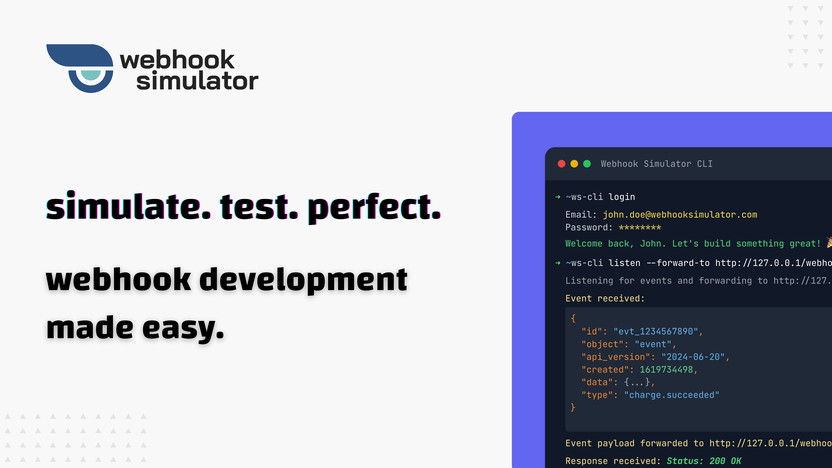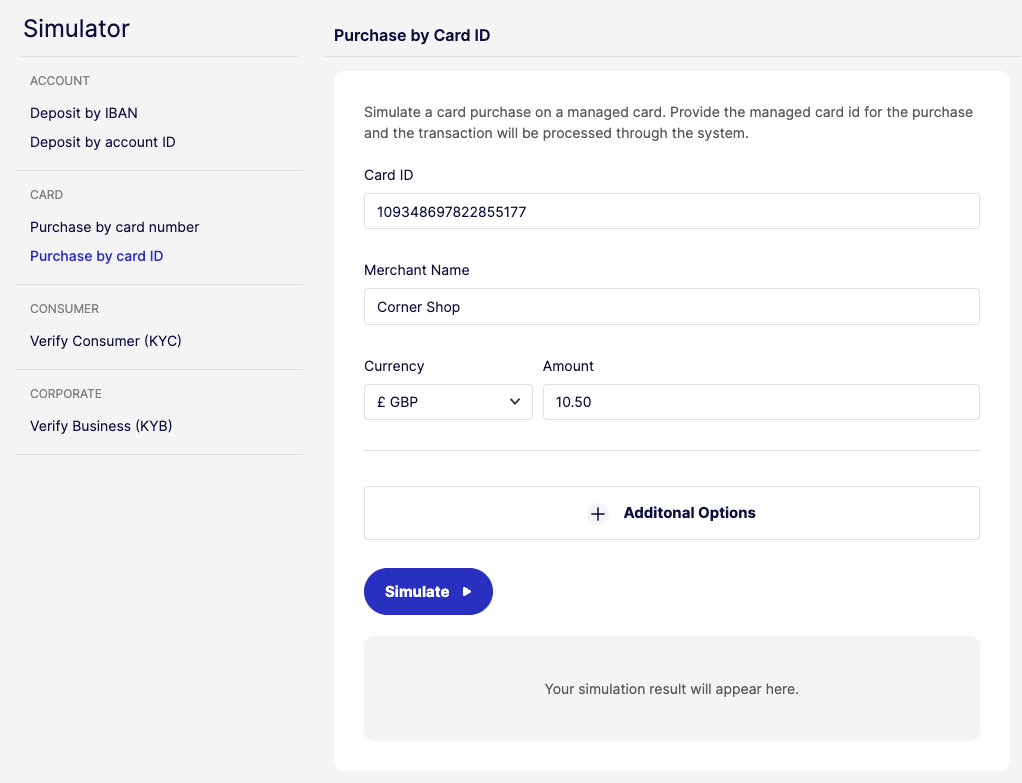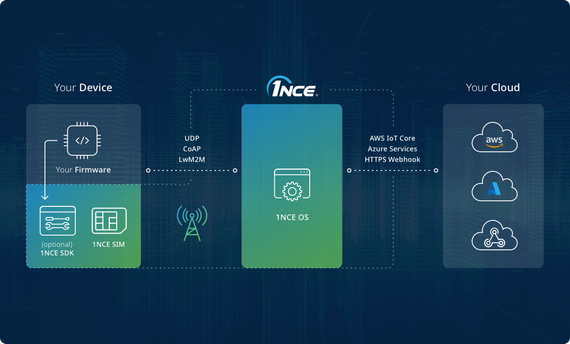Testing webhooks can be challenging. Developers need the right tools to streamline this process.
Introducing the Webhook Simulator, a developer-friendly tool designed to simplify webhook testing and debugging. This powerful tool helps developers of all skill levels generate realistic payloads, forward events to local environments, and visualize data effectively. Whether you are working on API integrations or perfecting webhook endpoints, the Webhook Simulator offers a complete solution. With features like a user-friendly interface, advanced JSON viewer, and multi-environment support, it reduces development time and enhances efficiency. Discover how the Webhook Simulator can optimize your development workflow and ensure smooth API interactions. Ready to enhance your webhook testing? Purchase the Webhook Simulator now: Webhook Simulator.
Introduction To Purchase Webhook Simulator
A Webhook Simulator is a tool for developers. It helps test webhooks. Webhooks are like messages from one app to another. They tell apps about events, like a new user signup.
The simulator makes it easy to see if webhooks work. It can simulate real events. It sends these events to your app. This helps find and fix problems.
The purpose of a Webhook Simulator is to help developers. They can test webhooks without causing real events. This saves time and avoids mistakes. It also helps understand how webhooks work.
Using a webhook simulator is important. It helps ensure webhooks work before going live. This means fewer errors and smoother app integrations. It’s a must-have for developers working with APIs.
Key Features Of Purchase Webhook Simulator
Webhook Simulator lets you test webhooks in real time. Forward payloads to your local environment with ease. Debug instantly and see results right away.
Customize payloads to fit your needs. Generate data without triggering real events. Ensure your endpoints handle all scenarios.
Simulate errors to test your system. Know how your application handles different error cases. Prepare for every possible situation.
Webhook Simulator works with many platforms. Forward webhooks to any URL. Access your logs and data from anywhere.
Real-time Testing
Get immediate feedback on your webhook configurations. Webhook Simulator sends real payloads to your local environment. This helps you catch errors quickly. You can see responses instantly. Fix issues on the spot. Save time and avoid frustration.
Webhook Simulator offers detailed logs. See colorful JSON formats. Understand the process clearly. Forward webhooks to any URL. Test and debug easily. Use the advanced JSON viewer to analyze responses. Suitable for local and staged environments.
Customizable Payloads
Webhook Simulator offers flexible data structures. Developers can create varied payloads. This helps in testing different scenarios. It ensures all cases are covered. You can modify payloads easily. This feature is vital for debugging.
Flexible Data Structures
Webhook Simulator allows diverse data types. JSON, XML, and others are supported. This aids in thorough testing. Developers can handle multiple formats. It makes the tool versatile. No need for extra conversions.
User-defined Parameters
Set your own parameters with Webhook Simulator. Customize according to your needs. Simulate real-world data accurately. This feature saves time. It also improves testing efficiency. Developers get more control over payloads.
Error Simulation
Using Webhook Simulator, developers can simulate different error scenarios. This helps in testing how systems react to errors. Simulating errors like 404 Not Found, 500 Internal Server Error, or timeouts can be done easily. This ensures systems handle these errors well. Also, testing different error codes helps catch potential issues early. By doing so, developers can improve the reliability of their webhooks. This tool makes it simple to create and manage these error scenarios.
Improving error handling is crucial for any system. Webhook Simulator helps in this by providing detailed logs. These logs show what went wrong and where. Developers can use this information to fix issues quickly. The visual logs make understanding errors easier. This leads to faster debugging and better system performance. Additionally, having a clear view of errors helps in creating more robust systems. Webhook Simulator ensures that all developers, regardless of skill level, can handle errors effectively.

Webhook Simulator
Integration With Multiple Platforms
Webhook Simulator works with many platforms. This makes it easy to test webhooks. You can use it with different APIs. No need to learn new tools. The interface is simple. Developers of all levels will find it easy to use.
Setting up Webhook Simulator is quick. Forward webhooks to your local environment. Debug in real-time. The tool generates realistic payloads. This helps in perfecting your webhook endpoints. Logs are detailed and visual. Track the whole process easily.
For more details, visit Webhook Simulator.
Pricing And Affordability
The Webhook Simulator offers two main plans. The Free Plan allows 10 requests per day. It includes access to a limited number of platforms, 24-hour log retention, and basic webhook testing. The Lifetime Deal offers unlimited requests, access to all platforms, permanent log retention, advanced webhook testing, and premium support. All future updates are included.
| Plan | Features | Price |
|---|---|---|
| Free Plan | 10 requests/day, limited platforms, 24-hour log retention | Free |
| Lifetime Deal | Unlimited requests, all platforms, permanent log retention | $59 (originally $149) |
The Free Plan is good for basic needs. The Lifetime Deal provides great value. It saves time and improves testing with its advanced features. Permanent log retention and premium support make it worth the investment.
Pros And Cons Of Purchase Webhook Simulator
Webhook Simulator is easy to use for all developers. It has a user-friendly interface. You can forward webhooks to your local environment or any URL. It supports both web app and CLI. Data simulation lets you create realistic webhook payloads. The advanced JSON viewer makes it easy to see and analyze data. This tool supports multiple environments. It provides detailed and visual logs for tracking. It helps you debug and test webhooks efficiently. It reduces development time by catching issues early. The tool is accessible for developers of all skill levels.
The free plan has some limitations. You can only make 10 requests per day. You get access to a limited number of platforms. Logs are retained for just 24 hours. Advanced features are not available in the free plan. You may need to buy the lifetime deal for unlimited requests and access to all features. The lifetime deal costs a one-time payment of $59. Some users might find this price high. The tool may be overwhelming for beginners.
Ideal Users And Scenarios
Developers and testers will find Webhook Simulator very useful. It helps in testing and debugging webhooks quickly. Its simple interface makes it easy to simulate and forward webhook payloads. This saves a lot of development time. Both beginners and experts can use it with ease.
E-commerce platforms can use Webhook Simulator to ensure their webhook integrations are flawless. It helps in creating realistic webhook events for testing purposes. This ensures that transactions and notifications work smoothly. This tool is essential for maintaining a reliable e-commerce system.
API integrators can leverage Webhook Simulator to test and debug webhook endpoints. It allows for real-time testing and data simulation. This ensures APIs interact properly with other systems. The tool’s flexibility makes it a must-have for any API integration project.

Webhook Simulator

Webhook Simulator
Frequently Asked Questions
What Is A Webhook Simulator?
A Webhook Simulator is a tool that mimics webhook events. It helps developers test and debug webhook integrations efficiently.
How Does A Webhook Simulator Work?
A Webhook Simulator generates fake webhook requests. These requests are sent to your endpoint, allowing you to test your webhook handling code.
Why Use A Webhook Simulator?
Using a Webhook Simulator simplifies debugging. It allows you to test different scenarios without waiting for real webhook events.
Can I Test Multiple Webhooks Simultaneously?
Yes, many Webhook Simulators support testing multiple webhooks. This feature helps in testing complex integrations and workflows.
Conclusion
Webhook Simulator simplifies webhook testing and debugging for developers. With features like data simulation and flexible forwarding, it caters to all skill levels. This tool saves time and ensures smooth API interactions. Try the free plan or get the lifetime deal for unlimited requests. For more details, visit the Webhook Simulator website.


